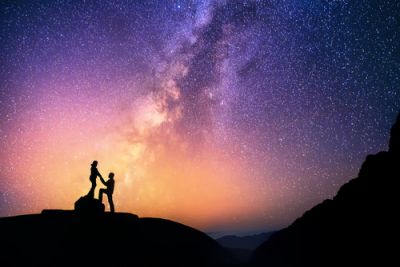 Astrology is in high demand these days, especially with adults under 35. The Guardian reported in March 2018 that horoscope readership has skyrocketed since 2016. Consulting natal charts has also become a common practice. In fact, some engaged couples even look to the stars to select an ideal wedding date! How does this work? You’ll likely find the answer to that question fascinating and thought-provoking.
Astrology is in high demand these days, especially with adults under 35. The Guardian reported in March 2018 that horoscope readership has skyrocketed since 2016. Consulting natal charts has also become a common practice. In fact, some engaged couples even look to the stars to select an ideal wedding date! How does this work? You’ll likely find the answer to that question fascinating and thought-provoking.
Electional Astrology: Timing Is Everything
You’re probably familiar with horoscopes and birth charts, but electional astrology applies to events. Astrologer Steven Forrest explains that it differs from other divination approaches. Most forms of astrology seek recommendations and guidance for making decisions. Instead, electional astrology focuses on the most auspicious timing for an event. Forrest describes the practice as selecting a birthdate for a moment. For a wedding, that means selecting a day and time with a strong chart containing positive aspects.
Electional astrology has existed in some form for thousands of years. The early Babylonians developed it, with some ideas later adopted by the ancient Greeks, Persians, and Indians. The Carmen Astrologicum, written by Greek astrologer Dorotheus of Sidon, describes electional astrology methods. Vedic astrology developed these practices further, calling them “muhurta.” In India, muhurta helps plan religious rituals, new business ventures, and weddings. Indian astrologers even suggest auspicious dates to begin shooting films.
How Wedding Astrology Works
For recommending ideal wedding dates, most astrologers look to a few factors. Brides writer Jessie Mooney discusses this process, referring to an earlier Refinery29 piece. Astrologer Leisa Schaim begins by asking the couple for their wedding date range, time, and location. Next, she’ll track planetary trends during the time period in question and consider several key aspects:
- Venus’ position
- Planets in retrograde
- Placement of the moon
Schaim then fills in more details by reviewing the sign and planet ruling the first house, which represents new beginnings. She also looks for relationships between planets, which manifest in hard and soft aspects like oppositions and trines. Schaim also compares these details with the couple’s individual natal charts.
How could planetary positions impact a wedding? Venus is especially vital since it rules love, beauty, and attraction. This planet rules Libra and Taurus, so its presence in either sign is encouraging. Venus is exalted in Pisces, meaning that its effects in that sign are always positive. Conversely, Venus in Virgo is a weak position and placements in either Aries or Scorpio inhibit or negatively impact its energies.
Meanwhile, the moon’s placement sets the emotional tone for the event. It rules Cancer, seen as a compassionate and nurturing sign. Some say the moon offers positive effects when exalted in Taurus, which is governed by Venus. Conversely, Scorpio is regarded as a weak position and in detriment when paired with Capricorn’s caution and logic. Other signs have their own effects, such as a Leo moon conducive to a huge joyful celebration.
Planets in retrograde can complicate matters. A retrograding Mercury could lead to logistical or communication issues. Venus in retrograde may dredge up past feelings for old lovers. When Mars goes into retrograde, one’s desires and energies can feel impeded, diffused, or frustrated.
Celestial Energies for Your Wedding
Some attribute astrology’s comeback to the human need to find certainty in uncertain times. With its recently surging popularity, it’s no surprise that some couples use it to select a wedding date. For these individuals, electional astrology can provide some important clues. Just as astrologers read and interpret natal charts, they can also view and decipher important heavenly aspects for a future date. It may be impossible to avoid all negative celestial positions and aspects. However, charting your chosen day might uncover some fascinating revelations.
Add Your Comment